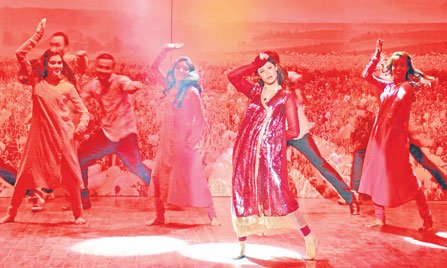
‘Junoon’ slams Prejudice
Adversity, especially one that leaves a person disabled and incapable of functioning as a human being, is something the trauma of which is far too obvious.
Despite the horrifying manifestations of physical adversity, we know of many cases where people have made it to the top in various fields; the Special Olympics are a vivid illustration of that and then there’s the blind cricket tournament.
The common denominator in all of these is hope: that exactly was the profound and moving message conveyed by a beautifully choreographed play ‘Junoon’ at the Arts Council on Thursday.
The play opens with vivacious dance sequences by a group of youngsters; the immaculately choreographed dances continue on a merry note until one of the female members of the group, Annie, meets an onstage accident and is rendered physically disabled.
Completely opposed to her perky, cheerful disposition, she becomes terribly morose, irate and reclusive: she refuses to see her former colleagues and, in her soliloquy, broods over her lot in life; all the love and sympathy showered on her by her colleagues fail to mitigate her sorrow.
What is portrayed in the most touching, poignant of manner is the extreme love and sympathy showered on her by her colleagues: how they try to cheer her up and how they pander to her tantrums, something that is the inevitable outcome of such a tragedy.
Things continue in that gloomy manner until another lady arrives in the person of wheelchair-riddled Amna (played by Farhat Rasheed, who also happens to be physically challenged in real life).
Seeing Annie’s morose condition, Amna tries to cheer her up and asks her to see the brighter side of life, to see that all is not lost with just the loss of a limb.
In a very loving and sympathetic manner, she induces Annie to see hope amid despair. She perseveres until Annie begins to see things from a more positive perspective.
She cites her own example to Annie whereby despite being disabled, she has won a gold medal in the MBA examination and landed herself a plum job.
In fact, life for Amna has again begun to have the music that goes with it after she conquers adversity and makes those achievements.
Amna’s example brings about a profound change in Annie’s attitude until one day all alone in her wheelchair, she’s singing in the most jocular of mood, with a smile of unbridled contentment, ‘Inn aankhon ki masti kay mastaanay hazaaron hain’.
The denouement comes with both Annie and Amna in their wheelchairs, lamenting the way the physically challenged are condemned to being castaways in our society, the way they are treated as just vegetables, the way society just doesn’t afford them a chance to exhibit their talents and potentialities, potentialities from which not only the unfortunate individuals but society and country at large could benefit.
They call for framing laws which treat the disabled as equals and equally respectable citizens of the country.
Reference: THE NEWS INTERNATIONAL, November 22nd, 2013